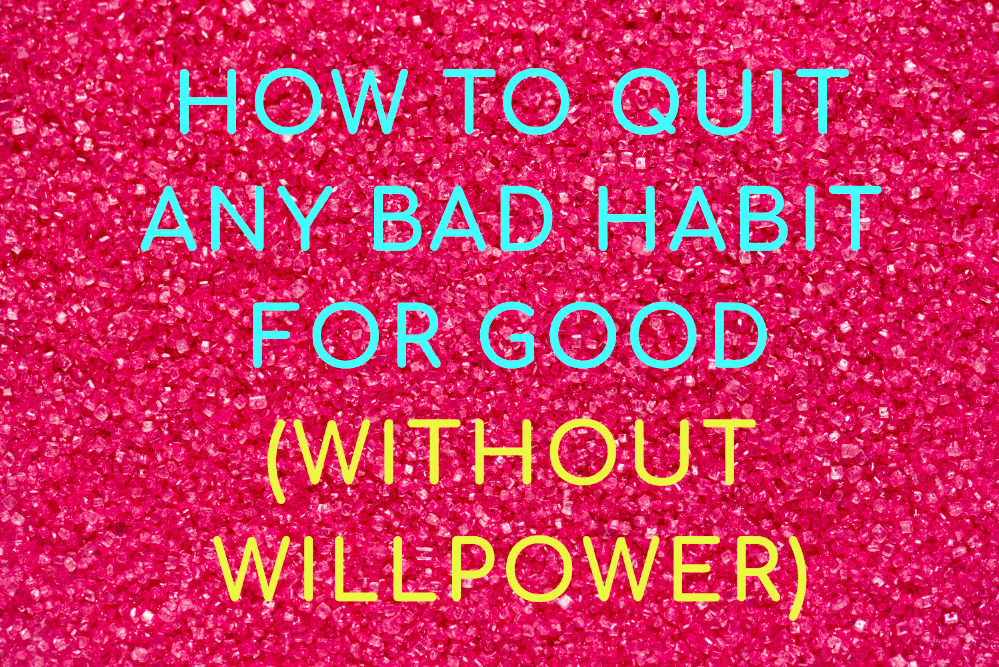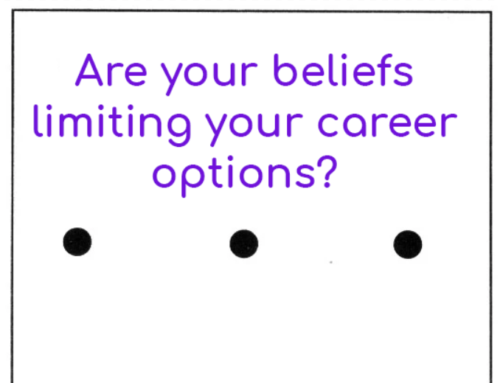Do you have a bad habit you would love to quit?
Smoking, sugar, alcohol, sex, biting your fingernails – we’ve all got at least one habit that we’re desperate to get rid of.
I’m going to tell you what you can do if you want to quit your bad habit for good. I know this works because I’ve followed these steps to quit my addiction to sugar. I can’t begin to describe how much better I feel (and look) now that I’m not sneaking into the sweets cupboard at any given chance.
The secret to how I quit my bad habit can be summarised with the ‘3 A’s’:
- Awareness & mindfulness
- Another habit
- Accountability
Let me explain them in turn and tell you how you can use them to your advantage.
Awareness & Mindfulness
Around 45% of our actions and behaviours are repetitive. Have a look at your patterns of behaviour on a given day, and I bet you’ll see that what you eat, where you sit, what time you make that cup of tea, are all quite predictable.
Most of the time we don’t pay attention though, and this is where the powerful ideas of awareness and mindfulness come in.
In the fascinating Ted Talk by Judson Brewer, he describes his study where focus was on whether mindfulness can help people quit smoking.
Instead of the focus being on using willpower to quit their smoking habit, participants were asked to simply be curious about their smoking. In fact, they were actually encouraged to smoke, as long as they just made sure to be really curious about what the experience was like.
The results were surprising – everyone knows rationally that smoking is bad for them, but what happened was that a large number of participants seemed to to move from ‘knowledge to wisdom’. In other words, the curiosity and mindfulness they had demonstrated while smoking resulted in the knowledge reaching much deeper.
“Mindful smoking: smells like stinky cheese, and tastes like chemicals, yuck”
– Mindful smoking participant
Being hyper aware and mindful is exactly what I did when I succeeded in quitting my sugar addiction a few years ago. For a couple of weeks I simply observed myself and my feelings closely when I felt the sugar craving.
I learnt a lot of things, for example that sometimes I just wanted the treat for the sake of being naughty, because I liked the idea of ‘getting away with acting like a naughty child’. The moment I noticed this it dawned on me how ridiculous that was. Next time I had a sugar craving, I was reminded of my discovery, and it contributed to me feeling a lot less excited about the treat.
All these small aha-moments add more and more weight to your sense of clarity.
Here’s what you should do:
So keep a diary of your life, and note down all the lessons you learn for 2 weeks. Notice in what situations you usually feel the urgency to indulge in your bad habit – are you feeling stressed, lonely, or just in need of some stimulation and fun? Dig deep and find out WHAT you’re actually craving.
Reflect on the the learnings every evening before you go to bed. Mindfulness is very powerful when it comes to breaking a bad habit, as it allows us to really clearly see what happens when we get caught up in our bad habits.
Another habit
Note that in this first phase, you’re absolutely allowed, in fact you’re encouraged, to pursue your bad habit. This allows you to detach yourself from your emotions when indulging.
Now that you have gathered a list of insights about your thoughts and feelings, it’s time to look at altering the behaviour that follows.
From my experience it isn’t possible to just get rid of a habit, but the good news is that you can alter it.
Here’s what you should do:
Have a think about which new positive habit you can implement in your life, which can be ‘attached’ to your bad habit. For example, I wanted to kick my addiction to sugar, so I created a small new habit called ‘before you eat any sweets at home after dinner, you must eat some fruit’.
In other words, I didn’t tell myself I couldn’t eat sweets, in fact I told myself I can always eat them whenever I want. BUT I have to eat a bit of fruit before.
This new habit (and I can warmly recommend the work by Stephen Guise on ‘Mini Habits’), worked wonders for me for 3 reasons.
- I didn’t feel I was missing out as I could still have the treat
- Often after eating the fruit I no longer felt the physical need for the treat
- In the time it took me to eat the fruit I was reminded of some of the small a-ha moments I had learned, which made me see what I truly craved in that moment (having a break, being social, being naughty etc.)
After concentrating on this habit for 3 weeks, I implemented another habit: ‘no sweets after 10 pm’. This gave me enough time to let the first habit sink in and become second nature, and yet wasn’t too difficult for me to cause me to feel I was missing out.
So have a good think about which 1 new habit can be attached to your bad habit, and make a tiny, positive change. Focus on sticking with it for 3 weeks (21 days is often seen as the magical number by which repetitive behaviours become habits), and then consider adding a 2nd habit.
If you want to learn more about which positive habits can make you more successful, check out my previous article How to adopt the 3 habits of my most successful clients.
Accountability
Last, but definitely not least, studies have shown we are much more likely to stick with our plans if we have to be accountable to someone else.

I made my partner my accountability partner when I quit my sugar habit, but you could choose anyone you like and respect, and make them invested in your success. It’s even better if they are also accountable to you for a goal they are trying to achieve.
Consider setting yourself a challenge like ‘quitting smoking/ coffee/ sugar for 21 days’. You could also add a rule that you have to pay the other person 50 GBP if you break the rule. Or, if you like me are more motivated by rewards than by avoiding penalties, you could agree to give yourself a massive treat (such as a massage or a dinner at your favorite restaurant).
Conclusion
To sum up, the 3 major methods I’ve described are:
Stage 1: Practising awareness and mindfulness around your bad habit, while still going about your life as normal.
Stage 2: Since changing or dropping a habit is next to impossible, introduce another habit that has the power to alter your bad habit over time.
Stage 3: I can’t state the importance of having an accountability partner, it really makes all the difference.
I hope I have given you some practical inspiration to get started on quitting your bad habit.
I’d be delighted to talk to you about how coaching can help you. A-ha (or lightbulb) moments are common in coaching sessions when we work on untangling your thoughts, and you would be accountable to a coach who would be very invested in your success.
I’d love to know if you have used any tools or methods successfully that helped you quit a bad habit?
Let me know in the comments below 🙂







This is so true. When I quit smoking many years ago, I decided to keep a journal and investigate, what I was experiencing and feeling just before I lit a cigarette. I realized that I used smoking to avoid feeling lonely and when that became obvious, I started calling my friends every time I had the need for a cigarette. Then I found out that I had a thing about reaching out that I needed to address, but that is a totally different story. The point is that awareness through the journal helped me quit smoking without a big effort and 10 years later I am still not smoking.
Thanks for sharing your experiences Nina, and glad some of the reflections resonate with you.
Amazing for actually quitting smoking, well done!
Which other methods or tools helped you to quit? I’d love to know, and I’m sure other people would too 🙂
Well, after a while of not smoking, I thought, I had it all under control and could allow myself just one single cigarette. But it tasted so bad and made me feel so sick. And then I just made sure to remember that sensation of nausea and quilt and the next time I felt like smoking, I was able to recall that sensation and feeling so vividly that I just didn’t feel like smoking anyway.
That’s so great to hear, I’m so happy you were able to quit smoking by doing this.
Hopefully this resonates with others as well, thanks again for sharing this Nina
Great advise Christine, I am trying to ditch sugar for some time now and I get defeated by those weak craving moments. I will implement you mindful approach next time I feel the urge to reach out for something sweet. I also agree that having fruits at those moments help immensely. I also have dried fruits and nuts handy when I feel desperate.
Thanks for your comment Sandra, great to hear you’ve found some inspiration.
I’ve found it’s impossible to gain weight by eating too much fresh fruit, so definitely try that one 🙂